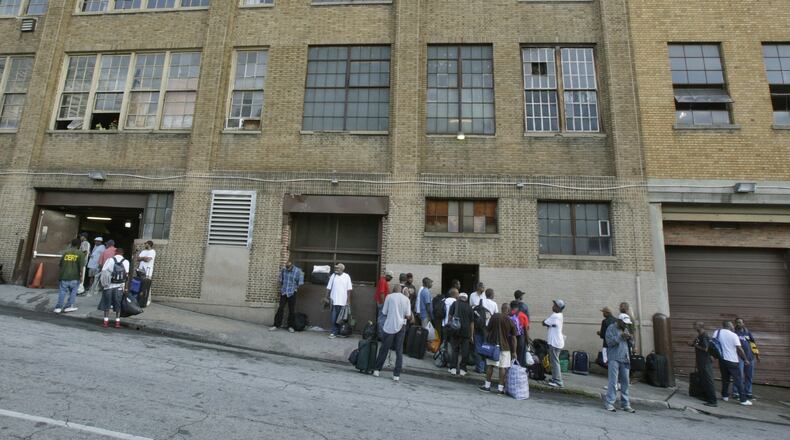An Atlanta City Council meeting turned raucous Monday when several dozen advocates for the homeless showed up to denounce Mayor Kasim Reed’s efforts to close a downtown shelter.
Police were called to control the crowd at the heated meeting in which the Council gave city leaders the go-ahead to begin negotiations to buy the Peachtree-Pine homeless shelter.
Reed has said he wants to convert the massive shelter at the corner of Peachtree and Pine streets into a state-of-the-art police and fire facility.
Some protesters complained loudly about being cut off when they went over their allotted two minutes for public comment. After repeated attempts to quell the crowd, City Council President Ceasar Mitchell asked that police remove some of the protesters, which turned into an angry confrontation between police and the advocates that spilled out of the council chambers and into city hall.
After one protester was detained and taken away, protesters questioned police for about 20 minutes, demanding to know what he had done and criticized police tactics as reasons why they have lost trust with some parts of the Atlanta community.
“I’m fine with folks shouting and screaming and giving you the business,” Mitchell said after the dust up. “But council members and the public expected a certain amount of decorum.”
Homeless advocate Chad Wright Pittman of Atlanta said he recognized the council’s need for order, but thought those voicing dissent were there with good intentions.
“Meetings like that can often stir up feelings,” he said. “But personally, I don’t think anyone there was doing anything violent or disrespectful. They were just very passionate.”
City officials have tried for years to close Peachtree-Pine, pointing to three separate tuberculosis outbreaks and the horde of men who always hang around outside the building as evidence something needs to be done.
The building can hold as many as 1,000 people nightly, though on an average evening only about 400 sleep there.
If the facility is closed, Reed has floated the idea of creating smaller shelters around the city, though nothing has been finalized.
But advocates for the homeless argue that Peachtree-Pine provides shelter to homeless people who are often hard to place, especially men with mental disabilities. If it closes, they fear the men would have no place to go.
The Council also approved the city to enter into negotiations to purchase two other properties — 463 Peachtree Street and 464 Peachtree Street — owned by St. Luke’s Episcopal Church. Both places serve the homeless.
If negotiations fail, then the administration will have to come back to the council for authority to pursue other options of acquiring the property.
About the Author
Keep Reading
The Latest
Featured



